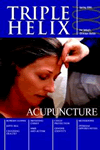Ironically, the only way that I could find time to a review this book was to take it on holiday, a holiday already marred by planning uncertainties at my NHS work which were going to affect me as soon as I returned. So I sat on my hotel balcony and in the airport lounge writing this review and felt guilty since taking work on holiday is definitely one activity which the authors do not applaud!
This is a very good book. The authors are two female academic GPs and a teenage daughter. Their writing is given added weight by being based on survey data and responses. Within an attractively printed paperback, about 100 pages of text are addressed directly to the reader. Both the quotations that are highlighted in text boxes and the well chosen cartoons succeed in breaking up the text, making it a very readable book. The nine chapters cover career-marriage conflict, the team family, stress, surviving time pressures, the importance of listening and talking, taking time off duty, and illness. The final chapter on making a logical plan will appeal to those personalities who like the grid box solution approach to problem solving, but are less useful to intuitives like me.
There is no Christian angle to this book, and in fact the only biblical material is the list of seven deadly sins, curiously unreferenced in an otherwise very well referenced piece of writing. Whilst these are described as strong motivators, the authors clearly do not regard them as desirable ones, although most of them can be observed on a regular basis in the NHS. This book sits very harmoniously alongside biblical teaching, and both Christians and non-Christians will benefit. It is timely since many of us have been forced into a much greater degree of personal reflection about our work and its personal impact as we go through appraisal. In the final chapter the authors state: 'This book is filled with good advice. You will have heard a considerable amount of it before...' They are right, but what makes this book special is the way that knowledge is illustrated and applied.
Who should read it? Any doctor will benefit, but those who need it most are unlikely to choose to read it, at least until they get desperate, have burned out, or their marriages have failed. It would make a superb gift to the newly or recently qualified doctor, which is probably where it will be most effective before attitudes become hardened. It has easily solved the problem of what to give my GP daughter for Christmas! And if I ruled the NHS I would give this book as a free handout to all doctors with their appraisal forms, and then make sure that it was handed on to their literate family members.
Reviewed byMichael Jones
associate specialist, Regional Infectious Diseases Unit,
Edinburgh Director Edinburgh International Health Centre
































